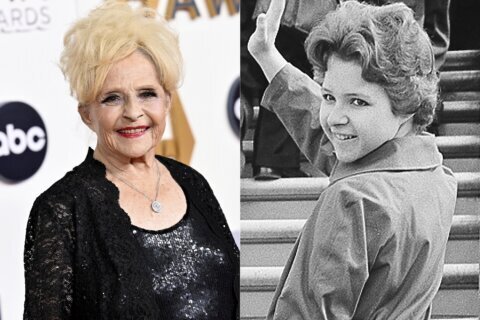DAKAR, Senegal (AP) — In a classroom at the House of Urban Culture, tucked away in the narrow streets of Dakar, Senegal, Aminata Thiam claps her hands in time with a beat she created on her computer.
“You just have to find the loop that you want. Cut it, duplicate the sample, and then add your effects,” she says.
She is teaching a beatmaking class to five young women, each working intently on beats of their own on the computers in front of them.
Thiam, 31, is a beatmaker, one of only a few women in Senegal who call themselves such. Their discipline is the art of “making beats, making rhythms,” Thiam says. She traces a line from American DJs like Afrika Bambaataa and DJ Kool Herc, credited as among the founders of hip-hop, to beatmakers today.
Those DJs made beats in the 1970s and ’80s using synthesizers or by isolating specific beats in a song and playing them on a loop by switching between two record players. “Now when we talk about beatmaking, we are talking about doing this with a computer,” Thiam says, crediting technology — including the advent of software — with democratizing the art.
The House of Urban Culture sees a rotating crew of anyone and everyone part of Senegal’s burgeoning hip-hop scene — rappers, slam poets, skaters and even the graffiti artists whose works adorn the walls. The center that opened in 2018 hosts rap concerts and beatboxing festivals, and offers free training in everything from DJing to photography in an effort to transform young people’s interest in hip-hop into professions.
Thiam’s stage name is “Myamy the Ay Girl,” a mixture of English and Wolof that means “the girl who can.” She was first drawn to beatmaking as a student a decade ago in Dakar, where a beatmaker had installed a studio at her university. She later trained with a program called Hip Hop Akademy, which now partners with the House of Urban Culture. Her current class here is only open to women — a necessity, she says, if there is to be any kind of equality in the field.
“Not just for music, but for audiovisual work, for cinema,” she says, emphasizing that knowing how to make music on a computer isn’t just applicable to hip-hop.
Although widespread access to computers has made beatmaking more accessible, the reliance on technology has also created a barrier inhibiting many of her students from continuing their work after the course has ended.
“In one household you may find that almost all of the men have a computer, but the women might only have a phone,” she says. According to the 2020 GSM Association Mobile Gender Gap Report, women in Senegal’s urban areas have almost the same access to the internet as men, but much less financial autonomy: Only 26% of women have bought their own smartphone, compared to 68% of men.
Djeneba Sylla, 21, is a singer who wanted to take Thiam’s class to learn how to make her own music.
“For the time being I don’t have a computer. But I hope to have it by the end of the class,” Sylla says. Thiam has started a campaign to raise money for her students.
The question of accessibility looms over much of the House of Urban Culture’s work in Senegal. Amadou Fall Ba was the center’s coordinator for 10 years, and now works with the city of Dakar on an initiative to create more public spaces for young people in an aim to make hip-hop more accessible.
He says hip-hop came to Senegal through the country’s middle class, “people who had TVs, who could watch the private channels, who could watch what was happening in the U.S.” It eventually made its way to the masses, and he says that now, 80% of the stars in Senegal’s larger urban culture scene are from working-class neighborhoods.
Women are still severely underrepresented though, he said.
“Mentalities have changed a little bit, but we are still in a conservative country. A young woman who is 25 or 30 years old who isn’t married — there is a strong social pressure on her,” he described.
In Thiam’s beatmaking class, the room is silent, each student lost in a different world underneath noise-canceling headphones. After six weeks of classes, the students are now able to produce beats of their own. They produce mostly modern hip-hop beats, though less refined than what Thiam can throw together in minutes in the studio.
As they continued working, Thiam stepped outside in the courtyard to speak about her own history. She says there are only three women working as beatmakers in Senegal — often producing beats for Senegalese rappers, but also making an income as sound technicians for concerts and stage productions. She hopes that the more women who are active in the art, the more other women will be inspired to start.
“If we train women who are capable of going far in this industry, this will encourage other women to join us,” she said.
She added that, in Senegal, women in music are often encouraged to sing or join a choir, things seen as acceptably feminine.
“I always liked music, but I didn’t want to be a singer,” she said. “I wanted to do something different.”
___
The Associated Press receives financial support for global health and development coverage in Africa from the Bill & Melinda Gates Foundation Trust. The AP is solely responsible for all content. Find AP’s standards for working with philanthropies, a list of supporters and funded coverage areas at AP.org.
Copyright © 2024 The Associated Press. All rights reserved. This material may not be published, broadcast, written or redistributed.







